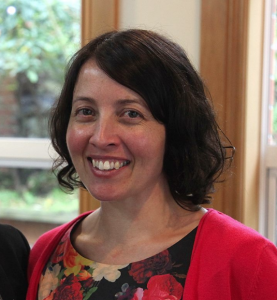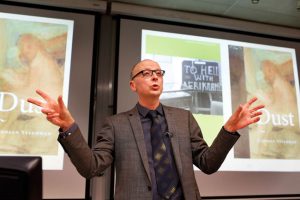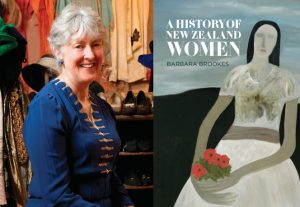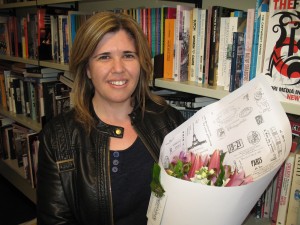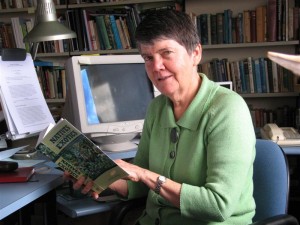Marsden success for Kate Stevens
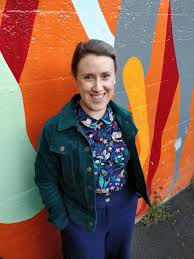 The Centre is really happy for the Marsden success of one of our associate members, Dr Kate Stevens, now based in the History programme at the University of Waikato. Her project, Urban island: Histories of dispossession and belonging in Suva, gained a Fast Start Marsden award in the 2020 round.
The Centre is really happy for the Marsden success of one of our associate members, Dr Kate Stevens, now based in the History programme at the University of Waikato. Her project, Urban island: Histories of dispossession and belonging in Suva, gained a Fast Start Marsden award in the 2020 round.
Kate is a former History student at Otago, who completed her PhD at Cambridge University in 2015, on colonial criminal justice in New Caledonia, Fiji and Vanuatu, then undertaking a postdoc back at Otago with Professor Judy Bennett’s project on the history of coconuts.
This has been a great year for Kate! As well as her Marsden, she won a teaching excellence award at Waikato, and a Camargo Fellowship. Each year, the Carmago Foundation Core Program brings 18 artists, thinkers, and scholars for residential scholarships in Cassis, France as part of its mission to support research in the Arts and Humanities. Kate will be joining the spring 2021 cohort (travel restrictions permitting) for 11 weeks to work on a new project examining the history of smell in the French colonial empire, and its legacies in contemporary products, tourism, and ideas of place. You can read more about Kate’s research on her website.
Congratulations, Kate!
Katie Pickles awarded a James Cook Research Fellowship
The Centre for Research on Colonial Culture extends warmest congratulations to Prof. Katie Pickles of the University of Canterbury’s History Programme, and former President of the New Zealand Historical Association, on being awarded a prestigious James Cook Research Fellowship by the Royal Society Te Apārangi. Katie will use the James Cook Fellowship to research heroines in global history, a topic on which she has extensively published during her career. We extend our congratulations on this wonderful acknowledgement of her research excellence and celebrate the recognition this award brings to New Zealand’s colonial and post-colonial histories. All the best for the project, Katie.
Mapping Workshop
Centre member Jane McCabe has had a busy year. In May her first book was published, and officially launched the following month. It’s been well-received and getting some great media attention including a spread in the Dominion Post, as well as on the New Books Network. Jane also started a new project in February.
Rural history is at the heart of her Marsden Fast Start project entitled ‘Splitting up the Farm? A Cross-Cultural History of Land and Inheritance in Aotearoa’. In late June she hosted a mapping workshop based around that project, which was supported by the Centre for Research on Colonial Culture. The one-day workshop brought together experts in rural history, land titles and mapping to discuss best practice in use of maps and land titles in order to help Jane as she works towards the production of effective visual outputs for the project. Jane began the day with a presentation in which she set out the research questions and aims for her investigation of familial land transfer in two districts (Taieri and Hokianga) from 1870 to 1970. This helped set the framework for the workshop and focus discussion on the advantages and disadvantages of land titles for a project about cross-histones of land use and inheritance. In order to foreground the land, and attitudes to it, Jane proposed a survey of land titles/ownership to show change over time, with the aim of collating data for communication on a digital platform.
Participants discussed the value of maps in helping think about the past spatially. One inspiring suggestion was that project participants might be encouraged to draw maps of their farms so that familial and individual approaches to land use could be illuminated, thereby providing a multiplicity of voices to land use that does not rely on official maps and land titles. Personal mapping might also enable social and cultural data to be mapped that might look different to official data, detailing how families members who might not be named as owners in fact worked and used the land. Later sessions discussed land titles and their value as historical sources for mapping land ownership over time and cross-culturally.
The Centre thanks Jane for hosting this event and all the participants for sharing their expertise: Malcolm McKinnon, Michael Roche, Jonathan West, Brian Coutts, Vivienne Cuff, Michael Stevens, Hugh Campbell, Tom Brooking, Michael Stevens and Angela Wanhalla, as well as Karen Craw for kindly showcasing the Hocken’s map holdings relating to the Taieri.
The Centre has been busy hosting a number of workshops this year, and have many more on the horizon. There’s a whaling history symposium in late June 2018 in Honolulu, for instance, along with plans for an event on Māori writing in November 2018, as well as a possible workshop on rural history in late 2018. Watch this space for further details.
New collaborations for Angela Wanhalla
Dr Angela Wanhalla, an active CROCC member, has been building on her success (two Marsden funded projects, a Rutherford Discovery Fellowship) with the success of an Australian Research Council Grant of just over $A500,000. Angela is a named international partner investigator on a Discovery Project headed by Profs. Lyndall Ryan, Amanda Nettleback, A/Profs Anna Johnston, Penelope Edmonds, and Victoria Haskins looking at violence and intimacy in settler societies across the Anglophone Pacific Rim, 1840-1940.
Marsden Success for Centre Member
Congratulations to CROCC member, Professor Judy Bennett, who was awarded $710,000 in the recent Marsden Fund round. Her research will explore ‘Constant coconuts: a history of a versatile commodity in the Pacific world’. Judy was also the lead investigator in the the Marsden Fund project ‘Mothers’ Darlings: children of indigenous women and World War Two American servicemen in New Zealand and South Pacific societies’ awarded in 2009.
‘Constant coconuts: a history of a versatile commodity in the Pacific world’.
Within the humid tropics, along the shorelines of atolls and high islands, the coconut palm flourishes, providing food, medicines, cosmetics, and household items for myriad Pacific societies. Yet no commodity history of the coconut exists. As a pathway to understanding globalisation, this research will analyse how from c.1840 onwards, products from the “nut” became commodities, how their production and consumption affected individual communities, power relations, mobility, culture, economies, and environment within the Pacific world and beyond. It will consider why, for most Island societies, the coconut became often the sole export staple, and the consequences of such dependency. A key focus is the fluctuating relationship between production and natural conditions, such as rainfall, as well as external challenges, such as declining markets, which tested indigenous agency. Recently, the coconut’s value as a source of biofuel and health and beauty products has significantly revived production. While the distant past is mainly recorded in archives, this network of producers, marketers, governments, and consumers is accessible to ethnographic methods, such as extended observation. The planned book will combine two perspectives: a) commodity chain analysis to trace economic and social linkages; b) ethnographic investigation. Archival and other documentary research will provide evidence for both.

